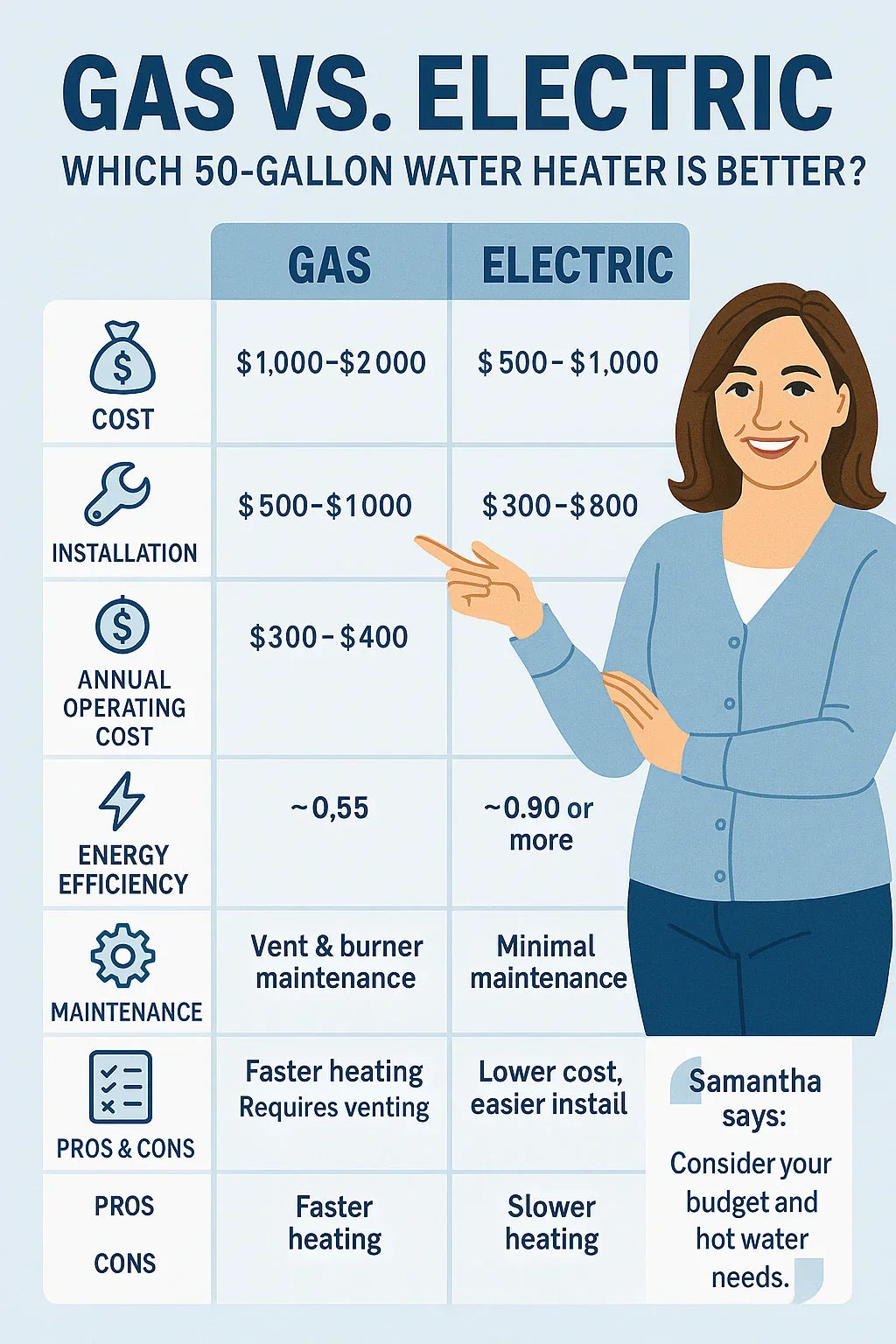👋 Samantha’s Research Journey
When Samantha’s old water heater finally failed, she faced the same decision millions of homeowners encounter: “Should I buy a gas or electric water heater?”
Her family of four needed reliable hot water every day—morning showers, nightly dishwashing, endless laundry loads. She narrowed her options down to 50-gallon gas vs. electric models. But which would be better for performance, cost, and long-term reliability?
This guide walks through Samantha’s research (and real-world experience) to help you decide whether a gas or electric 50-gallon water heater is right for your home.
🔥 How Gas and Electric Water Heaters Work
Both types of water heaters perform the same basic function: heat water and store it until you need it. But the heating method is different.
✅ Gas Water Heater
-
Uses a gas burner at the bottom of the tank.
-
Requires venting for combustion gases (chimney, direct vent, or power vent).
-
Heats water quickly.
✅ Electric Water Heater
-
Uses electric resistance heating elements inside the tank.
-
No venting required.
-
Heats water more slowly.
📖 Energy.gov – Water Heating Basics
💲 Purchase & Installation Costs
Samantha quickly realized there’s more to cost than just the sticker price of the unit.
🔹 Gas (50-Gallon)
-
Unit Price: $1,200–$2,000 (power vent models on the higher end).
-
Installation Labor: $800–$1,500 (requires venting, gas line hookups, and sometimes permits).
-
Electrical Outlet (for power vent models): $150–$400.
-
Total Installed Cost: $2,400–$4,500.
Samantha’s real-world cost was $3,505.
🔹 Electric (50-Gallon)
-
Unit Price: $500–$1,500.
-
Installation Labor: $300–$800 (simpler—no gas line or venting).
-
Total Installed Cost: $800–$2,300.
👉 Bottom line: Electric is cheaper to install, while gas has higher upfront costs.
📖 Water Heater Installation Costs
⚡ Operating Costs & Energy Efficiency
Upfront cost isn’t the whole story—you also need to consider monthly bills.
🔹 Gas
-
Annual Operating Cost: $250–$350.
-
UEF (Uniform Energy Factor): 0.62–0.70.
-
Natural gas is often cheaper per unit of energy than electricity.
🔹 Electric
-
Annual Operating Cost: $450–$600 (varies with local electricity rates).
-
UEF: 0.90+ (electric resistance heaters convert nearly all input into heat).
👉 Despite higher efficiency on paper, electric heaters often cost more to run because electricity is pricier than gas in most regions.
📖 Energy Star – Water Heater Efficiency
⏱️ Hot Water Recovery Rate (Performance)
This was a big factor for Samantha’s family. Four back-to-back showers every morning pushed her old unit to the limit.
🔹 Gas
-
Recovery Rate: 40–50 gallons per hour.
-
Can keep up with multiple showers + laundry/dishwasher running.
🔹 Electric
-
Recovery Rate: 15–20 gallons per hour.
-
Works fine for smaller households but may struggle with heavy usage.
👉 Samantha chose gas because her family needed fast recovery time.
📖 This Old House – Water Heater Performance
🛠️ Maintenance & Lifespan
Both types of heaters require basic maintenance, but gas models have more moving parts.
🔹 Gas Maintenance
-
Flush annually to remove sediment.
-
Inspect anode rod every 2–3 years.
-
Maintain blower fan/venting system.
-
Average lifespan: 8–12 years.
🔹 Electric Maintenance
-
Flush annually.
-
Check anode rod.
-
Replace heating elements as needed.
-
Average lifespan: 10–15 years (slightly longer than gas).
📖 Family Handyman – Water Heater Maintenance
🌍 Environmental Impact
Samantha wanted an option that was cost-efficient and eco-friendly.
🔹 Gas
-
Burns natural gas, releasing CO₂.
-
More efficient than older units, but still fossil fuel-based.
-
Risk of carbon monoxide if venting is blocked.
🔹 Electric
-
Cleaner at the point of use (no emissions).
-
Environmental impact depends on your grid (renewables vs. coal).
-
Can be paired with solar panels for a near-zero-emission setup.
👉 For eco-conscious homeowners with solar or renewable-heavy grids, electric may win.
📖 EPA – Energy Star Environmental Benefits
📊 Side-by-Side Comparison
| Feature | Gas (50-Gallon) | Electric (50-Gallon) |
|---|---|---|
| Unit Cost | $1,200–$2,000 | $500–$1,500 |
| Installed Cost | $2,400–$4,500 | $800–$2,300 |
| Annual Operating Cost | $250–$350 | $450–$600 |
| Recovery Rate | 40–50 GPH | 15–20 GPH |
| Maintenance | More (vent, blower, gas line) | Less (elements, anode rod) |
| Lifespan | 8–12 years | 10–15 years |
| Environmental Impact | Natural gas emissions | Cleaner, depends on grid |
🏠 Which Is Better for Your Home?
✅ Gas is better if:
-
You have natural gas available.
-
You have a family of 3–6 with high hot water demand.
-
You want lower operating costs long-term.
✅ Electric is better if:
-
Your home doesn’t have a gas line.
-
You want lower upfront costs.
-
You prefer low-maintenance operation.
-
You plan to pair it with solar panels for clean energy.
🏡 Samantha’s Final Choice
After running the numbers, Samantha chose a 50-gallon power vent gas water heater.
-
It cost more upfront, but with her family’s heavy hot water use, it was the only option that could keep up.
-
Her annual bills dropped by about $55 compared to her old standard vent gas heater.
-
She expects the unit to last 10–12 years with regular maintenance.
👉 Her advice: “Don’t just look at the price tag—consider how much hot water you use and your local utility costs. That’s what really makes the difference.”
✅ Conclusion: Gas vs. Electric — Which Wins?
There’s no universal winner—it depends on your home.
-
Gas: Best for large families, heavy hot water demand, and areas where natural gas is cheap.
-
Electric: Best for smaller households, budget-conscious installs, and homes without gas lines.
For Samantha, gas was the clear winner. For you, the right choice depends on family size, energy prices, and long-term priorities.
In the next topic we will know more about: First Hour Rating (FHR) Explained: Why It Matters When Choosing a Water Heater







